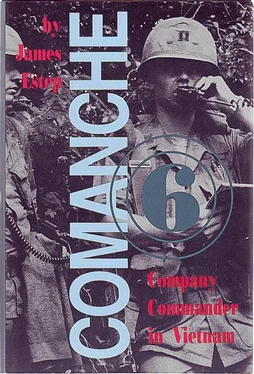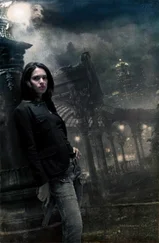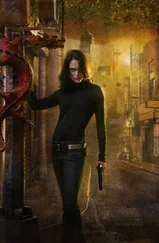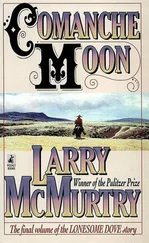She’s coming! I can barely hear her soft-soled nurse’s pumps on the darkened corridor’s tiled floor, but my hearing is attuned to the sounds that signal the approach of she who bears the magic potion.
Smiling down at me like the merciful angel she, for a fleeting moment, truly is, she gives me the shot. The magic flows through me, bringing in its wake peace. I ask her for a sleeping pill, but she says no, no more barbiturates.
That’s okay; it’ll give me a few relatively painless, conscious minutes to think about the company, to wonder where they now are and what they’re now doing. Rumor says they’re about to sally forth to pull the Marines’ chestnuts out of the fire at Khe Sanh. Bet they do and wish I were with them. Wish I were there, CAR-15 in one hand, map in the other, sunburned, filthy and sweating, boarding a slick and flying into the unknown.
God, I wish I were with them tonight!
1. The Cav, Vietnam bound. September 1967
The Southern Airways Columbus-Atlanta connector departed on schedule.
Like most other uniformed passengers aboard the early morning flight, I was on my way to the “pearl of the Orient” Vietnam. Unlike most other uniformed passengers, I was on my way a third time.
As the two-engine turboprop gained altitude, I felt a sudden yet familiar uneasiness, an ominous fear of the unknown mingled with a fleeting longing for the security of yesterday’s duties and the family that had just bid me farewell.
Why? I asked myself. Why go back again? Two times should be enough for any sane man. And don’t tell yourself it’s because of patriotic fever, that you’re once again heeding the trumpet’s call. You’re not.
Nor is it because America’s infantry is now in the fray and you, as a captain of infantry, should be in it with them. That’s not really it; you saw enough of that sort of thing last time around. Then why go again?
You know the answer. It’s because you like it! Yes, it’s really that simple; you like the pace of combat, like that awareness of life that only it seems to induce. You like to feel that sudden surge of adrenaline when confronting the unexpected; you like the lack of routine, the opportunity to innovate, the hunting of animals who do indeed shoot back, the stark terror and brilliant splendor of a firefight… and you like watching boys grow into men virtually overnight and in most cases being better off for having done so. You like the fear of the unknown, and for that matter you like these familiar feelings of apprehension and remorse you’re now experiencing.
It’s all part of it, and you like it all, don’t you?
With a trace of a smile, I silently answered myself, yes, I really do.
A flight attendant interrupted these philosophical wanderings, asking if I’d prefer coffee or juice before landing in Atlanta. I ordered tomato juice and then on the spur of the moment corrected myself, saying, “On second thought, put a little vodka in that virgin Mary, please.”
Might as well enjoy the service while it lasts; there’s gonna be some long dry spells ahead.
Reclining in my seat, drink in hand, my thoughts drifted back to that first trip to the Nam. Only five years ago? It seemed like a lifetime, and yet it seemed like only yesterday, but what a difference! There were no drinks served aboard that flight. In fact, there were few seats aboard those post-World War II, double-decker C-124 Globe Masters, three of which flew us in trail from Fort Bragg, North Carolina, to Saigon’s Tan Son Nhut airport about as quickly as we could have swum the distance.
At the time I was a twenty-four-year-old buck sergeant in the Army’s Special Forces en route to a war that had not yet become a war, or, as Sergeant Fallow was fond of saying, “It may not be much of a war, Jimbo, but it’s the only one we got”; then winking, as if sharing a secret known only amongst those of us who wore the green beret, he would always add, “At least it’s the only one the American people know about.” Which was incorrect, of course, since in 1962 the American public didn’t know or care about our “only war” in Vietnam, much less any of the smaller covert altercations he was alluding to.
Master Sergeant Al Fallow, my boss and mentor on that first tour… wonder whatever happened to him. Last I heard he was still somewhere in Southeast Asia doing his part for the CIA. I miss his endless philosophical quips and the way he related them to our “only war.”
Although it was not much of a war as wars go, by 1962 it was taking its toll in Special Forces soldiers, many of them close friends.
Yet death in combat was the exception, not the rule, in 1962. In fact, we saw more combat occur between different political and ethnic factions within South Vietnam than we experienced in our encounters with the Viet Cong (VC). We saw Montagnards we had trained to fight the VC turn instead on their South Vietnamese counterparts, we stood idly by as the country’s Buddhists set out to topple a government, and finally, sitting in a sandbagged bunker on a chilly November night in 1963, we learned that a president—who, on reflection, was probably the best hope for stability in his young republic—had “accidentally” committed suicide.
It was in many respects a learning tour, as was the next; however, the differences between the two could hardly have been more profound.
By 1965, our “only war” had literally exploded! Gone were the sixday work weeks and casual bus rides down to Cape Saint Jacques on Sundays; gone were greenback dollars, two-dollar whores, and tenpiaster beer LaRue. By 1965, prices had risen astronomically on everything except human life—it was still cheap, cheaper in fact.
I began that tour as a young, and very inexperienced, second lieutenant assigned to a remote Special Forces encampment on the Vietnamese/Laotian border. Its name was ARO, which translated could only mean “end of the earth.” Located on an isolated mountaintop deep in triple-canopy, uninhabitable tropical rain forest, it sat on terrain that could not be defended, in an area that could not be resupplied or reinforced, astride a dirt airstrip upon which planes could not land. Actually, that’s not completely true, now that I think of it. One airplane, an Australian Caribou as I recall, did in fact land… and I suppose it’s still there, since no airplane ever took off from ARO. In the end, the most frustrating thing about ARO was our mission, a mission that could not be accomplished.
The flight attendant’s announcement of our descent into Atlanta disrupted my thoughts. Good, I said to myself. Time to stop mulling over the past and start thinking about the future. After all, third time’s the charm, right? Next stop San Fran for a good meal, a night on Broadway, and then off to the land that God created during a coffee break.
Early the next evening, along with 160 or so other soldiers and Marines, several Air Force personnel, and a single sailor, I boarded a chartered World Airways flight and followed the sun westward. It was a more comfortable and far quicker passage than the previous two had been. All of us were military, and all would be staying in the Nam. Most of us would return home whole in body twelve months hence, some sooner in pieces, and in the fall of ‘67 it was a statistical certainty that others would make the long flight back in flag-draped coffins.
The flight crew, of course, was civilian and would not be spending a single night in the Nam. After dropping us off and picking up a load of Stateside returnees, they would fly on to spend their night’s crew rest in some four-star Tokyo hotel.
There were no four-star hotels in Cam Ranh. Upon landing, the trip-long horseplay, laughter, and joking ended abruptly, replaced by an eerie silence. Finally, a young flight stewardess, who had boosted morale throughout our Pacific crossing, announced our arrival over the plane’s PA system.
Читать дальше












